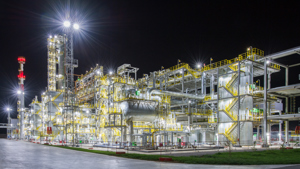ABB technology to drive production and energy efficiency at Olefin III, Europe’s largest petrochemical investment in 20 years
ABB, working alongside Hyundai Engineering and Técnicas Reunidas, have been employed to install their market leading distributed control system (DCS) ABB Ability System 800xA at the new Olefin III complex in Plock, Poland. Integrating ABB Ability System 800xA control architecture across the entire mega development, PKN Orlen will be able to constantly monitor and analyze plant productivity, maximizing asset performance, managing power consumption, ensuring product quality, and optimizing process efficiency in real time.
Harnessing this continuous stream of data, the company, in line with their objective to achieve a 30 percent reduction in CO2 emissions per ton of product, will be able to make more accurate, informed decisions to drive efficient use of energy. This includes maintaining tight controls over raw material consumption, plant energy levels and waste by-products.
“As part of our sustainability strategy, ABB is committed to supporting our customers in reducing their annual CO2 emissions by more than 100 Mt by 2030. Combining our expertise in the market alongside our leading DCS technology for complex plant operations we can help PKN Orlen to maximize its return on investment,” said Brandon Spencer, President ABB Energy Industries.
Alongside the DCS, ABB will also deliver several systems aimed at ensuring the complex operates at optimum safety levels, including a Burner Management System (BMS), an Emergency Shutdown System (ESD) and High-Integrity Pressure Protection System (HIPPS). These will be complemented by an industrial cyber security solution focused upon mitigating cyber threats towards the complex.
Olefins form the base compound made up of hydrogen and carbon to produce a mix of everyday products including cleaning, hygiene, and medical products, including the synthetic fibers used in protective clothing and masks (PPE). The global market was valued at $232.45 B in 2020, and it is expected grow at an annual rate of 4.5 percent reaching a value of $329.30 B by 2028. This exponential growth is driven by consumer demand and increased use across the global plastics industry.
The project is scheduled for completion in 2024 with operations due to start in 2025. To support this timeline ABB will apply its unique project methodology Adaptive Execution. Adaptive Execution harnesses virtual engineering and digitalization to deliver a streamlined, standardized and agile experience for all stakeholders. Through this methodology ABB can lower delivery time by up to 30 percent, start-up hours by up to 40 percent and overall automation related capital costs by up to 40 percent.







Comments